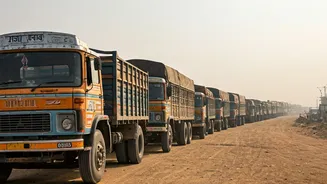Delhi's Air Deterioration
Recent reports reveal a decline in Delhi's air quality, classifying it as 'poor'. This signifies that the air contains elevated levels of pollutants, making
it a health concern for the city's inhabitants. The reasons for this decline can be attributed to several factors including vehicular emissions, industrial activity, and seasonal influences. The 'poor' air quality level is a significant indicator of environmental challenges within the metropolitan region, and necessitates the need for immediate countermeasures and strategic long-term initiatives to effectively address this crucial issue. Public awareness about the impact of air pollution is essential, as is encouraging preventive behavior among the citizens to preserve the health of the community and the environment.
Truck Ban Implementation
In response to the deteriorating air quality, authorities have implemented a ban on older, non-Delhi-registered trucks entering the city. This measure is a direct effort to curb pollution, especially from vehicles that contribute significantly to the particulate matter in the atmosphere. The ban is enforced along the borders of Delhi, ensuring that vehicles that do not meet the specified emissions standards are prevented from entering the city. While this action is targeted at minimizing air pollution, it simultaneously poses logistical problems for transportation and commerce. It is imperative that the government oversees the impact of the prohibition, including its effect on commerce and the daily lives of Delhi residents, and modify the plan to ensure effective outcomes while minimizing adverse consequences.
Border Enforcement Measures
The enforcement of the truck ban is concentrated on the borders surrounding Delhi, which is where monitoring and preventive measures are being implemented. These areas will see intensified surveillance to ensure compliance with the new regulations, with specific authorities being designated to carry out these checks. This proactive method helps in managing the flow of traffic, and prevents prohibited vehicles from entering the city. The enforcement process requires coordination among several departments, which ensures the smooth execution of the plan. The implementation is intended to provide immediate relief from the rising pollution, but also requires stringent monitoring to identify non-compliance and take proper action against offenders. These steps are a part of a larger plan to improve the city's air quality and ensure a healthier living environment for the residents.
Impact and Implications
The air quality improvements and potential economic disruptions are some of the immediate consequences of the truck ban. Reduced air pollution is intended to be the major benefit, which will improve public health and the overall well-being of the residents. On the other hand, the restriction on the movement of trucks may lead to delays in the transportation of goods, which could impact the supply chain and commercial activities. In the long term, these actions call for an integrated approach involving multiple elements, including improvements to the city's public transportation system, promoting electric vehicles, and encouraging people to adopt environmental practices. The effectiveness of the actions will eventually be determined by the city's capacity to balance public health concerns with economic realities. Therefore, it is essential for the government to evaluate the plan's long-term influence and adjust the strategy to address any difficulties.














